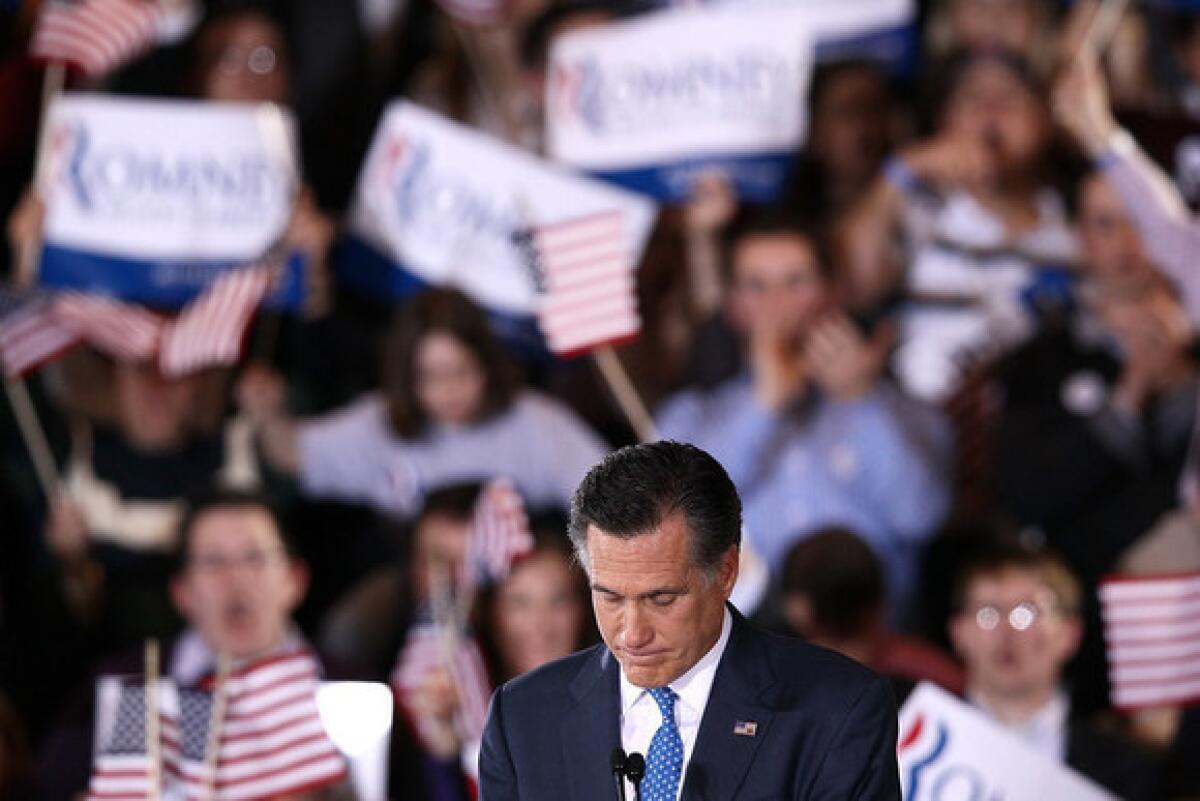Analysis: Romney fails to deliver knockout blow on Super Tuesday

- Share via
Reporting from Washington — After contests in 22 states, Mitt Romney is still the favorite to become the Republican presidential nominee. He’s got the money. He’s got the machine. And increasingly, and most importantly, he’s got the delegates.
But despite a good showing on Super Tuesday, he hasn’t put the race away by any means. And he’s unlikely to do that anytime soon. By some authoritative estimates, he can’t secure a mathematical lock on the nomination until sometime in May, at the earliest.
More worrying for Romney, and a Republican establishment that desperately wants the race over with, is how the campaign will play out over the next month or two.
Romney’s challenge is to pull his fractured party together as quickly as possible and bring an end to what has been a very damaging primary season. The harsh tone and extreme language of the GOP race has frightened the independents whose votes will be crucial in the fall. Recent polling indicates that the public views Romney more unfavorably, at this stage of the election, than any Republican nominee in a generation.
But Romney’s own campaign tactics have greatly contributed to the ugly atmosphere of the GOP race. He’s won his three biggest primaries -- in Florida, Michigan and, very narrowly, Ohio -- by beating his challengers to a pulp with unrelenting negative campaign tactics, fueled by a massive financial edge.
Rick Santorum, Newt Gingrich and Ron Paul won’t make it easy for him to bend that formula in a more positive direction. They aren’t going anywhere, except to the next round of primaries – which, incidentally, don’t look all that good for Romney.
Santorum also had a good Super Tuesday, spiced by victories in Tennessee and Oklahoma and a surprise win in North Dakota. But it could have been great, resetting the race, had he gotten just a few thousand more votes in Ohio.
Still, Santorum has won half a dozen states and emerged as Romney’s main -- and toughest -- challenger. An agile campaigner, the former senator seems to be crafting his strategy on the back of an envelope; his campaign’s greatest asset is his own political skill. Santorum’s emotional election-night speech Tuesday, delivered extemporaneously, hit themes of family and freedom and heartland values in Ohio, a state that decides close presidential elections.
However, he lacks a clear path to the nomination. It is all but out of reach for him, mathematically. “We’re in it to stay,” Santorum said Tuesday night, suggesting he’ll be running for quite some time.
Romney, by contrast, helms a data-driven campaign, deeply staffed with the best talent money can buy. But he continues to struggle, a politician who lacks authenticity. He read his victory speech Tuesday night, not all that impressively, from a teleprompter (the device that Republicans love to lampoon when they skewer President Obama).
At the same time, he has lengthened his delegate lead and has the money and organization to win a drawn-out battle. He told supporters in Boston that there will be “good days” and “bad days” ahead, preparing them for a rocky ride.
Gingrich is a complicating factor for all of the Republicans. Marginalized by his failure to win outside the Deep South, he gave an angry election-night speech that would have done Tom Watson, the archetypal Georgia populist, proud. Gingrich lacerated the “elite” of the Republican establishment and the Wall Street financiers backing Romney, whom he portrayed as a liar.
Gingrich related a fable, with himself as “the tortoise” who has already outlasted a bunch of rabbits, suggesting a candidacy that will rumble along until casino mogul Sheldon Adelson cuts off the cash.
“On to Tampa,” Gingrich exhorted supporters in suburban Atlanta, referring to the GOP convention in late August. But he’s become, at best, a regional candidate, and still must get past Santorum in Mississippi and Alabama next week to preserve what remains of his viability.
Paul, who has failed to meet the expectations of his enthusiasts, lags far behind, but he’s made it clear that he’ll try to pick up delegates until the voting ends in June.
This combination of multiple non-Romney candidates with little or nothing to lose will make it very hard for former Massachusetts governor to move the campaign into the consolidation phase. He’d like to be able to plod from state to state as the likely nominee, racking up delegates and trying to avoid unforced errors, while the news media’s attention shifts to an Obama-Romney showdown in the fall.
Instead, the primary battle will likely rage on, for weeks or even months.
More to Read
Sign up for Essential California
The most important California stories and recommendations in your inbox every morning.
You may occasionally receive promotional content from the Los Angeles Times.










